Rowlinson Knitwear: Organisational Learning and Performance Analysis
VerifiedAdded on 2023/06/18
|11
|3345
|320
Report
AI Summary
This report analyses the role of organisational learning in improving organisational performance at Rowlinson Knitwear, a UK-based cloth manufacturing organisation. It highlights the importance of knowledge creation, retention, and transfer within the organisation. The report discusses organisational learning theory, emphasising the formulation of a learning culture and the benefits of individual, team, and continuous learning. It also explores different learning theories such as classical conditioning, operant conditioning, cognitive theory, and social learning theory, and their application within Rowlinson Knitwear. Furthermore, the report examines the 4I model of organisational learning (Intuiting, Interpreting, Integrating, and Institutionalising) and its impact on organisational productivity. The analysis demonstrates how a focus on in-house learning models can maximise productivity and foster a competitive edge.

Learning and Development
.
.
Paraphrase This Document
Need a fresh take? Get an instant paraphrase of this document with our AI Paraphraser
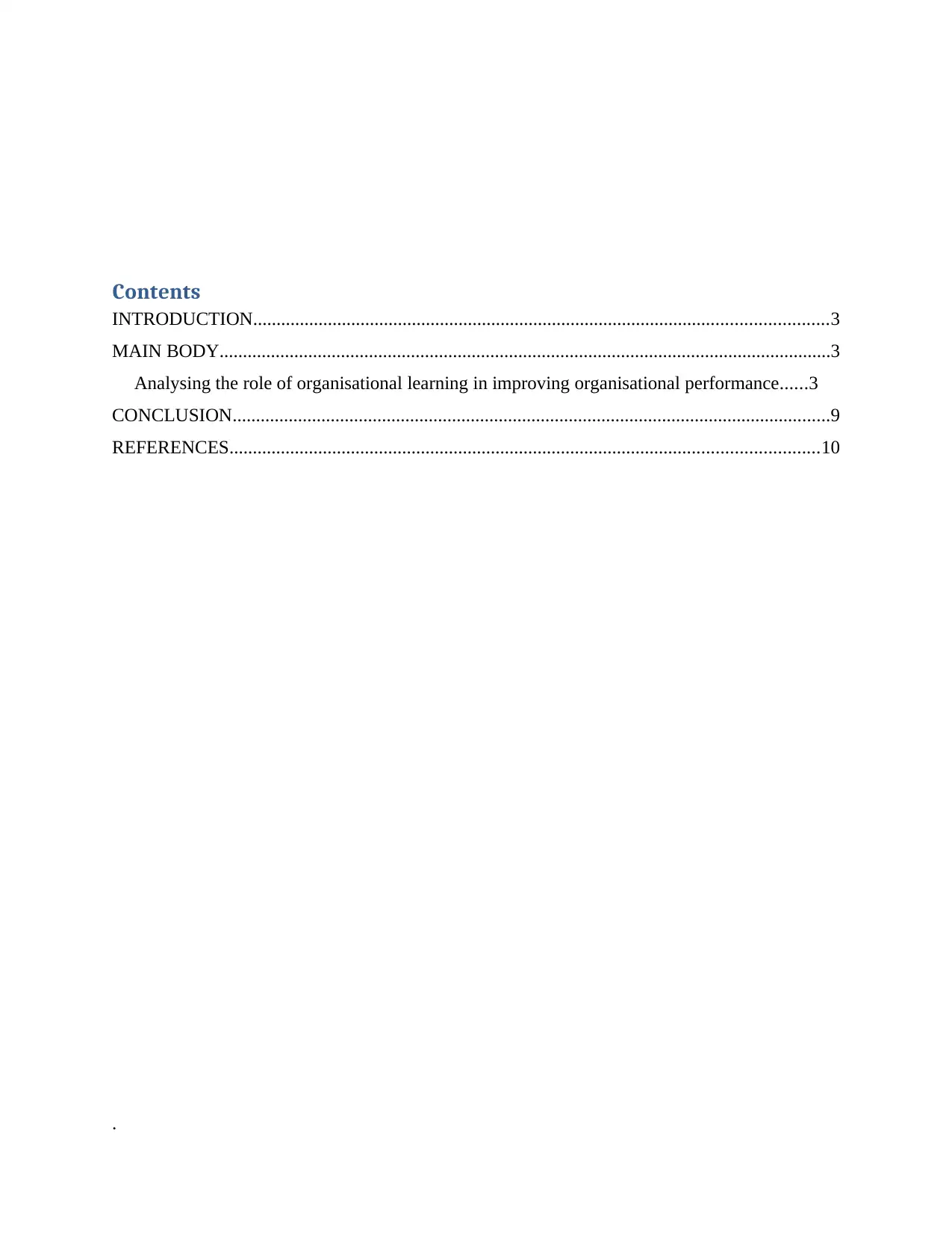
Contents
INTRODUCTION...........................................................................................................................3
MAIN BODY...................................................................................................................................3
Analysing the role of organisational learning in improving organisational performance......3
CONCLUSION................................................................................................................................9
REFERENCES..............................................................................................................................10
.
INTRODUCTION...........................................................................................................................3
MAIN BODY...................................................................................................................................3
Analysing the role of organisational learning in improving organisational performance......3
CONCLUSION................................................................................................................................9
REFERENCES..............................................................................................................................10
.
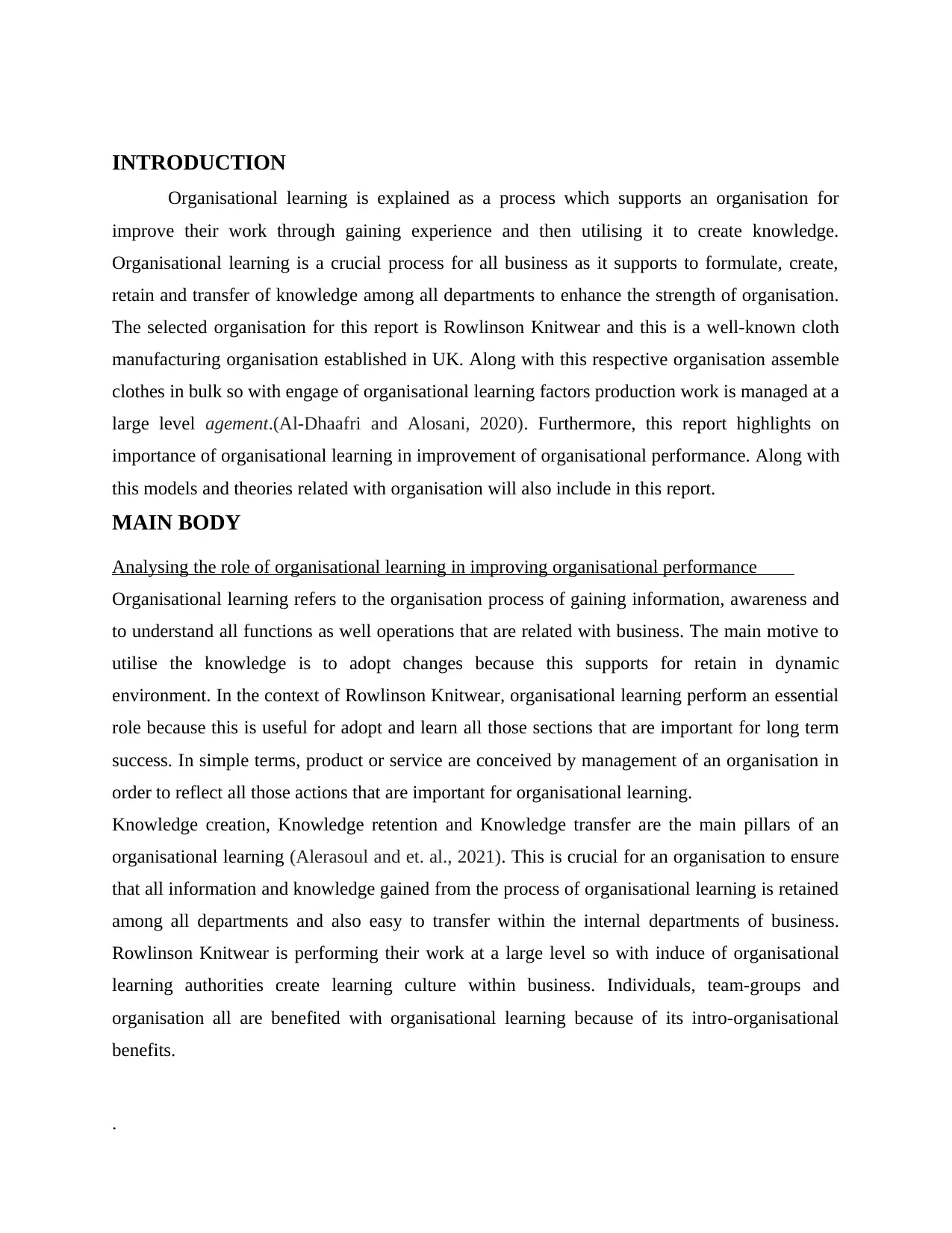
INTRODUCTION
Organisational learning is explained as a process which supports an organisation for
improve their work through gaining experience and then utilising it to create knowledge.
Organisational learning is a crucial process for all business as it supports to formulate, create,
retain and transfer of knowledge among all departments to enhance the strength of organisation.
The selected organisation for this report is Rowlinson Knitwear and this is a well-known cloth
manufacturing organisation established in UK. Along with this respective organisation assemble
clothes in bulk so with engage of organisational learning factors production work is managed at a
large level agement.(Al-Dhaafri and Alosani, 2020). Furthermore, this report highlights on
importance of organisational learning in improvement of organisational performance. Along with
this models and theories related with organisation will also include in this report.
MAIN BODY
Analysing the role of organisational learning in improving organisational performance
Organisational learning refers to the organisation process of gaining information, awareness and
to understand all functions as well operations that are related with business. The main motive to
utilise the knowledge is to adopt changes because this supports for retain in dynamic
environment. In the context of Rowlinson Knitwear, organisational learning perform an essential
role because this is useful for adopt and learn all those sections that are important for long term
success. In simple terms, product or service are conceived by management of an organisation in
order to reflect all those actions that are important for organisational learning.
Knowledge creation, Knowledge retention and Knowledge transfer are the main pillars of an
organisational learning (Alerasoul and et. al., 2021). This is crucial for an organisation to ensure
that all information and knowledge gained from the process of organisational learning is retained
among all departments and also easy to transfer within the internal departments of business.
Rowlinson Knitwear is performing their work at a large level so with induce of organisational
learning authorities create learning culture within business. Individuals, team-groups and
organisation all are benefited with organisational learning because of its intro-organisational
benefits.
.
Organisational learning is explained as a process which supports an organisation for
improve their work through gaining experience and then utilising it to create knowledge.
Organisational learning is a crucial process for all business as it supports to formulate, create,
retain and transfer of knowledge among all departments to enhance the strength of organisation.
The selected organisation for this report is Rowlinson Knitwear and this is a well-known cloth
manufacturing organisation established in UK. Along with this respective organisation assemble
clothes in bulk so with engage of organisational learning factors production work is managed at a
large level agement.(Al-Dhaafri and Alosani, 2020). Furthermore, this report highlights on
importance of organisational learning in improvement of organisational performance. Along with
this models and theories related with organisation will also include in this report.
MAIN BODY
Analysing the role of organisational learning in improving organisational performance
Organisational learning refers to the organisation process of gaining information, awareness and
to understand all functions as well operations that are related with business. The main motive to
utilise the knowledge is to adopt changes because this supports for retain in dynamic
environment. In the context of Rowlinson Knitwear, organisational learning perform an essential
role because this is useful for adopt and learn all those sections that are important for long term
success. In simple terms, product or service are conceived by management of an organisation in
order to reflect all those actions that are important for organisational learning.
Knowledge creation, Knowledge retention and Knowledge transfer are the main pillars of an
organisational learning (Alerasoul and et. al., 2021). This is crucial for an organisation to ensure
that all information and knowledge gained from the process of organisational learning is retained
among all departments and also easy to transfer within the internal departments of business.
Rowlinson Knitwear is performing their work at a large level so with induce of organisational
learning authorities create learning culture within business. Individuals, team-groups and
organisation all are benefited with organisational learning because of its intro-organisational
benefits.
.
⊘ This is a preview!⊘
Do you want full access?
Subscribe today to unlock all pages.

Trusted by 1+ million students worldwide
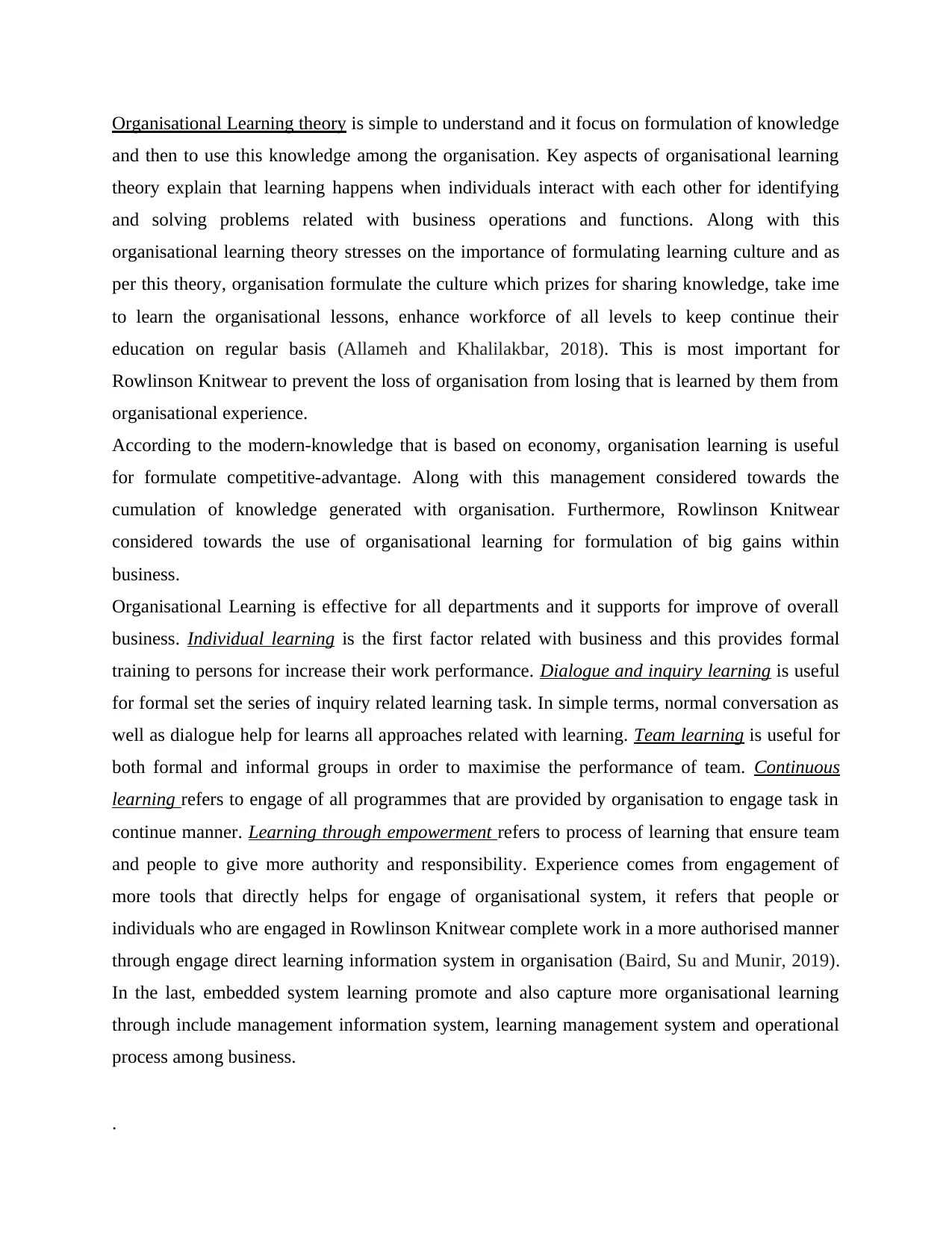
Organisational Learning theory is simple to understand and it focus on formulation of knowledge
and then to use this knowledge among the organisation. Key aspects of organisational learning
theory explain that learning happens when individuals interact with each other for identifying
and solving problems related with business operations and functions. Along with this
organisational learning theory stresses on the importance of formulating learning culture and as
per this theory, organisation formulate the culture which prizes for sharing knowledge, take ime
to learn the organisational lessons, enhance workforce of all levels to keep continue their
education on regular basis (Allameh and Khalilakbar, 2018). This is most important for
Rowlinson Knitwear to prevent the loss of organisation from losing that is learned by them from
organisational experience.
According to the modern-knowledge that is based on economy, organisation learning is useful
for formulate competitive-advantage. Along with this management considered towards the
cumulation of knowledge generated with organisation. Furthermore, Rowlinson Knitwear
considered towards the use of organisational learning for formulation of big gains within
business.
Organisational Learning is effective for all departments and it supports for improve of overall
business. Individual learning is the first factor related with business and this provides formal
training to persons for increase their work performance. Dialogue and inquiry learning is useful
for formal set the series of inquiry related learning task. In simple terms, normal conversation as
well as dialogue help for learns all approaches related with learning. Team learning is useful for
both formal and informal groups in order to maximise the performance of team. Continuous
learning refers to engage of all programmes that are provided by organisation to engage task in
continue manner. Learning through empowerment refers to process of learning that ensure team
and people to give more authority and responsibility. Experience comes from engagement of
more tools that directly helps for engage of organisational system, it refers that people or
individuals who are engaged in Rowlinson Knitwear complete work in a more authorised manner
through engage direct learning information system in organisation (Baird, Su and Munir, 2019).
In the last, embedded system learning promote and also capture more organisational learning
through include management information system, learning management system and operational
process among business.
.
and then to use this knowledge among the organisation. Key aspects of organisational learning
theory explain that learning happens when individuals interact with each other for identifying
and solving problems related with business operations and functions. Along with this
organisational learning theory stresses on the importance of formulating learning culture and as
per this theory, organisation formulate the culture which prizes for sharing knowledge, take ime
to learn the organisational lessons, enhance workforce of all levels to keep continue their
education on regular basis (Allameh and Khalilakbar, 2018). This is most important for
Rowlinson Knitwear to prevent the loss of organisation from losing that is learned by them from
organisational experience.
According to the modern-knowledge that is based on economy, organisation learning is useful
for formulate competitive-advantage. Along with this management considered towards the
cumulation of knowledge generated with organisation. Furthermore, Rowlinson Knitwear
considered towards the use of organisational learning for formulation of big gains within
business.
Organisational Learning is effective for all departments and it supports for improve of overall
business. Individual learning is the first factor related with business and this provides formal
training to persons for increase their work performance. Dialogue and inquiry learning is useful
for formal set the series of inquiry related learning task. In simple terms, normal conversation as
well as dialogue help for learns all approaches related with learning. Team learning is useful for
both formal and informal groups in order to maximise the performance of team. Continuous
learning refers to engage of all programmes that are provided by organisation to engage task in
continue manner. Learning through empowerment refers to process of learning that ensure team
and people to give more authority and responsibility. Experience comes from engagement of
more tools that directly helps for engage of organisational system, it refers that people or
individuals who are engaged in Rowlinson Knitwear complete work in a more authorised manner
through engage direct learning information system in organisation (Baird, Su and Munir, 2019).
In the last, embedded system learning promote and also capture more organisational learning
through include management information system, learning management system and operational
process among business.
.
Paraphrase This Document
Need a fresh take? Get an instant paraphrase of this document with our AI Paraphraser
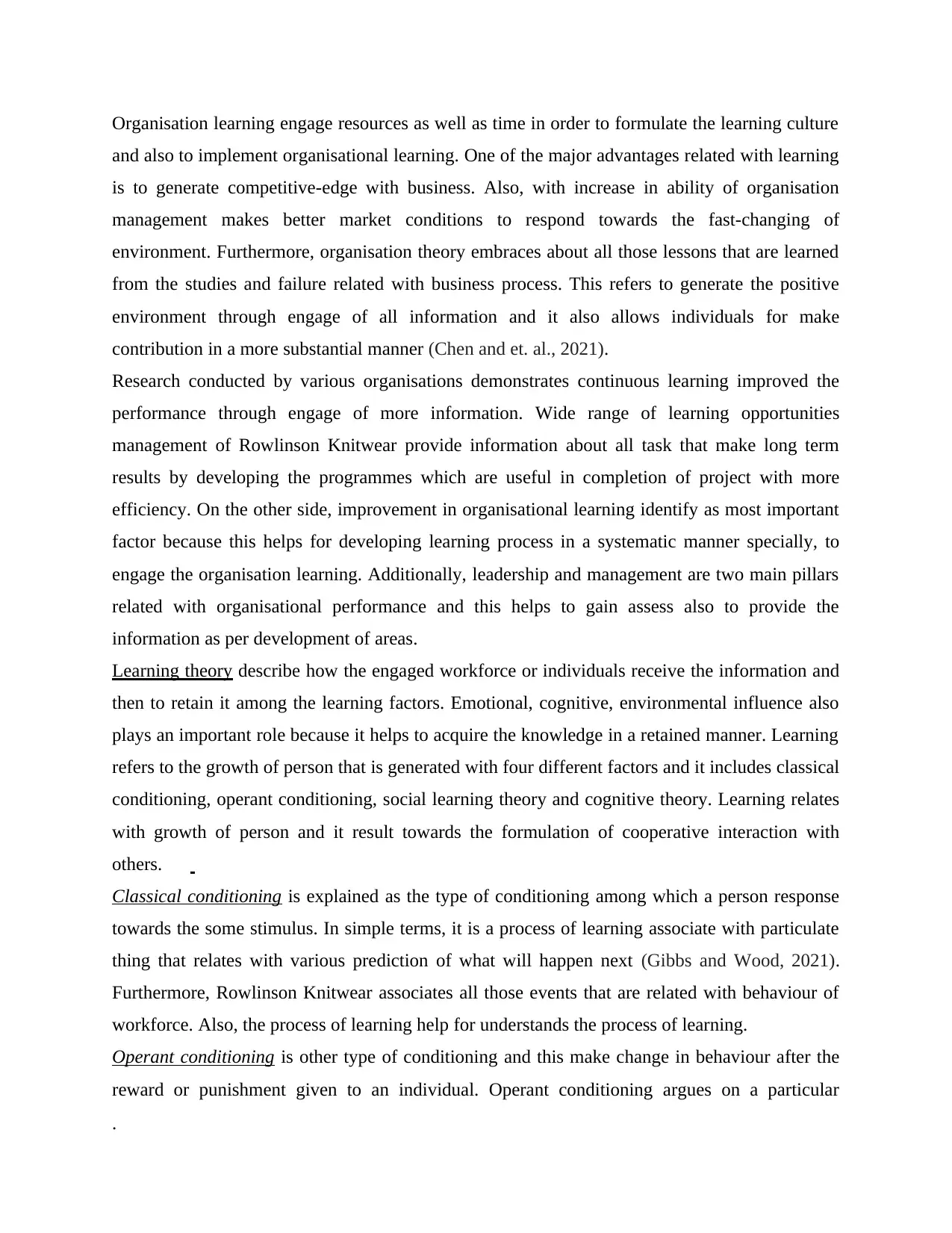
Organisation learning engage resources as well as time in order to formulate the learning culture
and also to implement organisational learning. One of the major advantages related with learning
is to generate competitive-edge with business. Also, with increase in ability of organisation
management makes better market conditions to respond towards the fast-changing of
environment. Furthermore, organisation theory embraces about all those lessons that are learned
from the studies and failure related with business process. This refers to generate the positive
environment through engage of all information and it also allows individuals for make
contribution in a more substantial manner (Chen and et. al., 2021).
Research conducted by various organisations demonstrates continuous learning improved the
performance through engage of more information. Wide range of learning opportunities
management of Rowlinson Knitwear provide information about all task that make long term
results by developing the programmes which are useful in completion of project with more
efficiency. On the other side, improvement in organisational learning identify as most important
factor because this helps for developing learning process in a systematic manner specially, to
engage the organisation learning. Additionally, leadership and management are two main pillars
related with organisational performance and this helps to gain assess also to provide the
information as per development of areas.
Learning theory describe how the engaged workforce or individuals receive the information and
then to retain it among the learning factors. Emotional, cognitive, environmental influence also
plays an important role because it helps to acquire the knowledge in a retained manner. Learning
refers to the growth of person that is generated with four different factors and it includes classical
conditioning, operant conditioning, social learning theory and cognitive theory. Learning relates
with growth of person and it result towards the formulation of cooperative interaction with
others.
Classical conditioning is explained as the type of conditioning among which a person response
towards the some stimulus. In simple terms, it is a process of learning associate with particulate
thing that relates with various prediction of what will happen next (Gibbs and Wood, 2021).
Furthermore, Rowlinson Knitwear associates all those events that are related with behaviour of
workforce. Also, the process of learning help for understands the process of learning.
Operant conditioning is other type of conditioning and this make change in behaviour after the
reward or punishment given to an individual. Operant conditioning argues on a particular
.
and also to implement organisational learning. One of the major advantages related with learning
is to generate competitive-edge with business. Also, with increase in ability of organisation
management makes better market conditions to respond towards the fast-changing of
environment. Furthermore, organisation theory embraces about all those lessons that are learned
from the studies and failure related with business process. This refers to generate the positive
environment through engage of all information and it also allows individuals for make
contribution in a more substantial manner (Chen and et. al., 2021).
Research conducted by various organisations demonstrates continuous learning improved the
performance through engage of more information. Wide range of learning opportunities
management of Rowlinson Knitwear provide information about all task that make long term
results by developing the programmes which are useful in completion of project with more
efficiency. On the other side, improvement in organisational learning identify as most important
factor because this helps for developing learning process in a systematic manner specially, to
engage the organisation learning. Additionally, leadership and management are two main pillars
related with organisational performance and this helps to gain assess also to provide the
information as per development of areas.
Learning theory describe how the engaged workforce or individuals receive the information and
then to retain it among the learning factors. Emotional, cognitive, environmental influence also
plays an important role because it helps to acquire the knowledge in a retained manner. Learning
refers to the growth of person that is generated with four different factors and it includes classical
conditioning, operant conditioning, social learning theory and cognitive theory. Learning relates
with growth of person and it result towards the formulation of cooperative interaction with
others.
Classical conditioning is explained as the type of conditioning among which a person response
towards the some stimulus. In simple terms, it is a process of learning associate with particulate
thing that relates with various prediction of what will happen next (Gibbs and Wood, 2021).
Furthermore, Rowlinson Knitwear associates all those events that are related with behaviour of
workforce. Also, the process of learning help for understands the process of learning.
Operant conditioning is other type of conditioning and this make change in behaviour after the
reward or punishment given to an individual. Operant conditioning argues on a particular
.
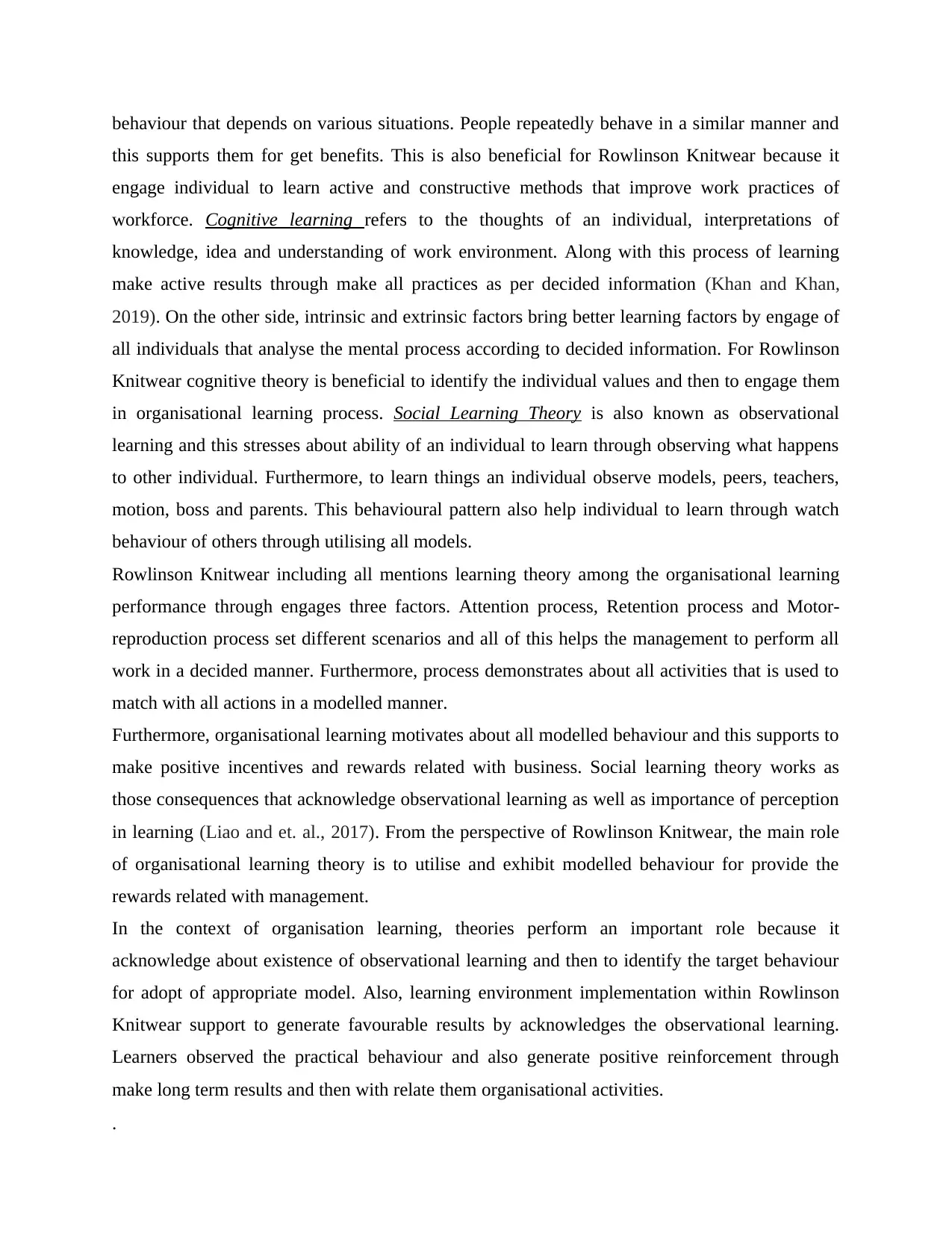
behaviour that depends on various situations. People repeatedly behave in a similar manner and
this supports them for get benefits. This is also beneficial for Rowlinson Knitwear because it
engage individual to learn active and constructive methods that improve work practices of
workforce. Cognitive learning refers to the thoughts of an individual, interpretations of
knowledge, idea and understanding of work environment. Along with this process of learning
make active results through make all practices as per decided information (Khan and Khan,
2019). On the other side, intrinsic and extrinsic factors bring better learning factors by engage of
all individuals that analyse the mental process according to decided information. For Rowlinson
Knitwear cognitive theory is beneficial to identify the individual values and then to engage them
in organisational learning process. Social Learning Theory is also known as observational
learning and this stresses about ability of an individual to learn through observing what happens
to other individual. Furthermore, to learn things an individual observe models, peers, teachers,
motion, boss and parents. This behavioural pattern also help individual to learn through watch
behaviour of others through utilising all models.
Rowlinson Knitwear including all mentions learning theory among the organisational learning
performance through engages three factors. Attention process, Retention process and Motor-
reproduction process set different scenarios and all of this helps the management to perform all
work in a decided manner. Furthermore, process demonstrates about all activities that is used to
match with all actions in a modelled manner.
Furthermore, organisational learning motivates about all modelled behaviour and this supports to
make positive incentives and rewards related with business. Social learning theory works as
those consequences that acknowledge observational learning as well as importance of perception
in learning (Liao and et. al., 2017). From the perspective of Rowlinson Knitwear, the main role
of organisational learning theory is to utilise and exhibit modelled behaviour for provide the
rewards related with management.
In the context of organisation learning, theories perform an important role because it
acknowledge about existence of observational learning and then to identify the target behaviour
for adopt of appropriate model. Also, learning environment implementation within Rowlinson
Knitwear support to generate favourable results by acknowledges the observational learning.
Learners observed the practical behaviour and also generate positive reinforcement through
make long term results and then with relate them organisational activities.
.
this supports them for get benefits. This is also beneficial for Rowlinson Knitwear because it
engage individual to learn active and constructive methods that improve work practices of
workforce. Cognitive learning refers to the thoughts of an individual, interpretations of
knowledge, idea and understanding of work environment. Along with this process of learning
make active results through make all practices as per decided information (Khan and Khan,
2019). On the other side, intrinsic and extrinsic factors bring better learning factors by engage of
all individuals that analyse the mental process according to decided information. For Rowlinson
Knitwear cognitive theory is beneficial to identify the individual values and then to engage them
in organisational learning process. Social Learning Theory is also known as observational
learning and this stresses about ability of an individual to learn through observing what happens
to other individual. Furthermore, to learn things an individual observe models, peers, teachers,
motion, boss and parents. This behavioural pattern also help individual to learn through watch
behaviour of others through utilising all models.
Rowlinson Knitwear including all mentions learning theory among the organisational learning
performance through engages three factors. Attention process, Retention process and Motor-
reproduction process set different scenarios and all of this helps the management to perform all
work in a decided manner. Furthermore, process demonstrates about all activities that is used to
match with all actions in a modelled manner.
Furthermore, organisational learning motivates about all modelled behaviour and this supports to
make positive incentives and rewards related with business. Social learning theory works as
those consequences that acknowledge observational learning as well as importance of perception
in learning (Liao and et. al., 2017). From the perspective of Rowlinson Knitwear, the main role
of organisational learning theory is to utilise and exhibit modelled behaviour for provide the
rewards related with management.
In the context of organisation learning, theories perform an important role because it
acknowledge about existence of observational learning and then to identify the target behaviour
for adopt of appropriate model. Also, learning environment implementation within Rowlinson
Knitwear support to generate favourable results by acknowledges the observational learning.
Learners observed the practical behaviour and also generate positive reinforcement through
make long term results and then with relate them organisational activities.
.
⊘ This is a preview!⊘
Do you want full access?
Subscribe today to unlock all pages.

Trusted by 1+ million students worldwide
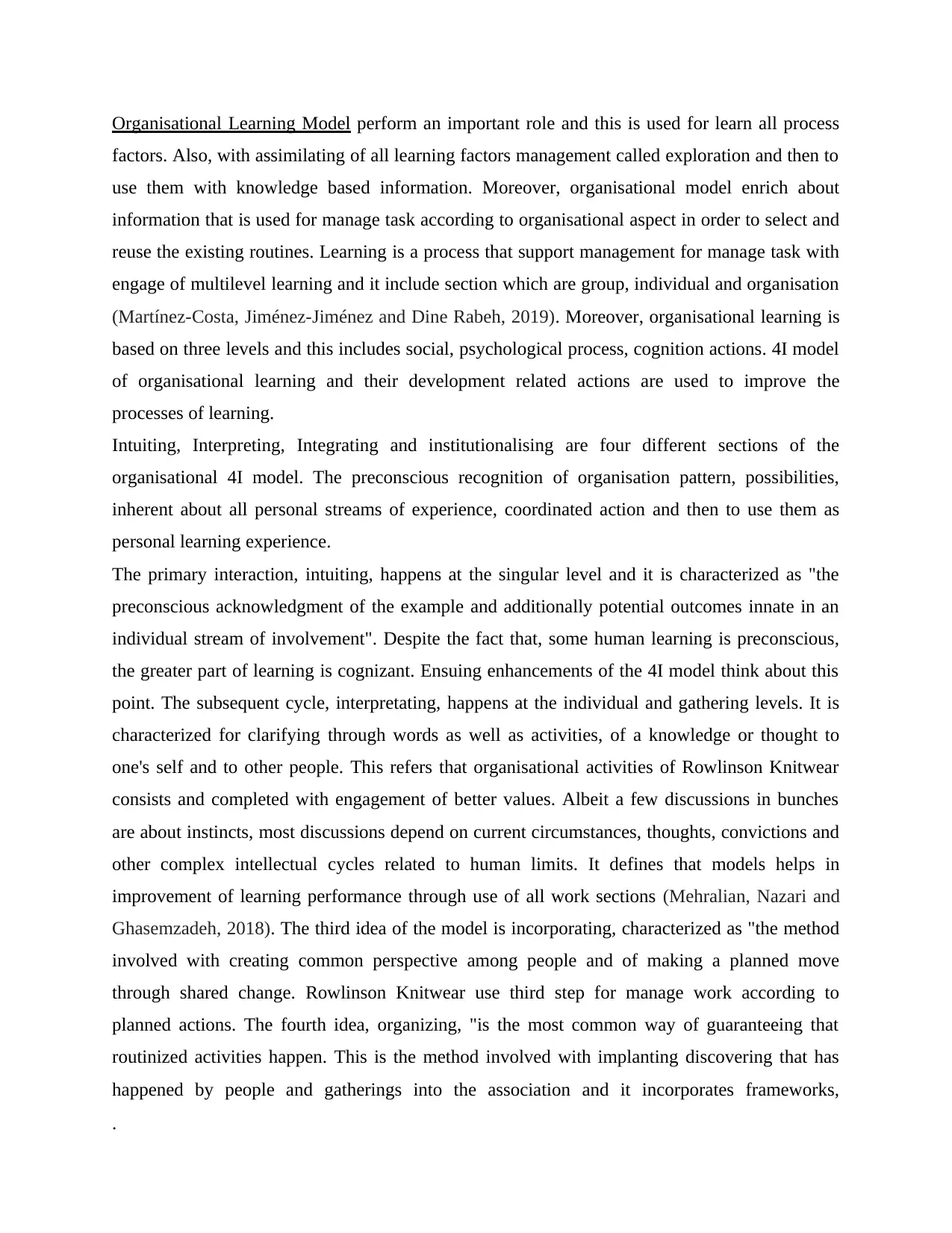
Organisational Learning Model perform an important role and this is used for learn all process
factors. Also, with assimilating of all learning factors management called exploration and then to
use them with knowledge based information. Moreover, organisational model enrich about
information that is used for manage task according to organisational aspect in order to select and
reuse the existing routines. Learning is a process that support management for manage task with
engage of multilevel learning and it include section which are group, individual and organisation
(Martínez-Costa, Jiménez-Jiménez and Dine Rabeh, 2019). Moreover, organisational learning is
based on three levels and this includes social, psychological process, cognition actions. 4I model
of organisational learning and their development related actions are used to improve the
processes of learning.
Intuiting, Interpreting, Integrating and institutionalising are four different sections of the
organisational 4I model. The preconscious recognition of organisation pattern, possibilities,
inherent about all personal streams of experience, coordinated action and then to use them as
personal learning experience.
The primary interaction, intuiting, happens at the singular level and it is characterized as "the
preconscious acknowledgment of the example and additionally potential outcomes innate in an
individual stream of involvement". Despite the fact that, some human learning is preconscious,
the greater part of learning is cognizant. Ensuing enhancements of the 4I model think about this
point. The subsequent cycle, interpretating, happens at the individual and gathering levels. It is
characterized for clarifying through words as well as activities, of a knowledge or thought to
one's self and to other people. This refers that organisational activities of Rowlinson Knitwear
consists and completed with engagement of better values. Albeit a few discussions in bunches
are about instincts, most discussions depend on current circumstances, thoughts, convictions and
other complex intellectual cycles related to human limits. It defines that models helps in
improvement of learning performance through use of all work sections (Mehralian, Nazari and
Ghasemzadeh, 2018). The third idea of the model is incorporating, characterized as "the method
involved with creating common perspective among people and of making a planned move
through shared change. Rowlinson Knitwear use third step for manage work according to
planned actions. The fourth idea, organizing, "is the most common way of guaranteeing that
routinized activities happen. This is the method involved with implanting discovering that has
happened by people and gatherings into the association and it incorporates frameworks,
.
factors. Also, with assimilating of all learning factors management called exploration and then to
use them with knowledge based information. Moreover, organisational model enrich about
information that is used for manage task according to organisational aspect in order to select and
reuse the existing routines. Learning is a process that support management for manage task with
engage of multilevel learning and it include section which are group, individual and organisation
(Martínez-Costa, Jiménez-Jiménez and Dine Rabeh, 2019). Moreover, organisational learning is
based on three levels and this includes social, psychological process, cognition actions. 4I model
of organisational learning and their development related actions are used to improve the
processes of learning.
Intuiting, Interpreting, Integrating and institutionalising are four different sections of the
organisational 4I model. The preconscious recognition of organisation pattern, possibilities,
inherent about all personal streams of experience, coordinated action and then to use them as
personal learning experience.
The primary interaction, intuiting, happens at the singular level and it is characterized as "the
preconscious acknowledgment of the example and additionally potential outcomes innate in an
individual stream of involvement". Despite the fact that, some human learning is preconscious,
the greater part of learning is cognizant. Ensuing enhancements of the 4I model think about this
point. The subsequent cycle, interpretating, happens at the individual and gathering levels. It is
characterized for clarifying through words as well as activities, of a knowledge or thought to
one's self and to other people. This refers that organisational activities of Rowlinson Knitwear
consists and completed with engagement of better values. Albeit a few discussions in bunches
are about instincts, most discussions depend on current circumstances, thoughts, convictions and
other complex intellectual cycles related to human limits. It defines that models helps in
improvement of learning performance through use of all work sections (Mehralian, Nazari and
Ghasemzadeh, 2018). The third idea of the model is incorporating, characterized as "the method
involved with creating common perspective among people and of making a planned move
through shared change. Rowlinson Knitwear use third step for manage work according to
planned actions. The fourth idea, organizing, "is the most common way of guaranteeing that
routinized activities happen. This is the method involved with implanting discovering that has
happened by people and gatherings into the association and it incorporates frameworks,
.
Paraphrase This Document
Need a fresh take? Get an instant paraphrase of this document with our AI Paraphraser
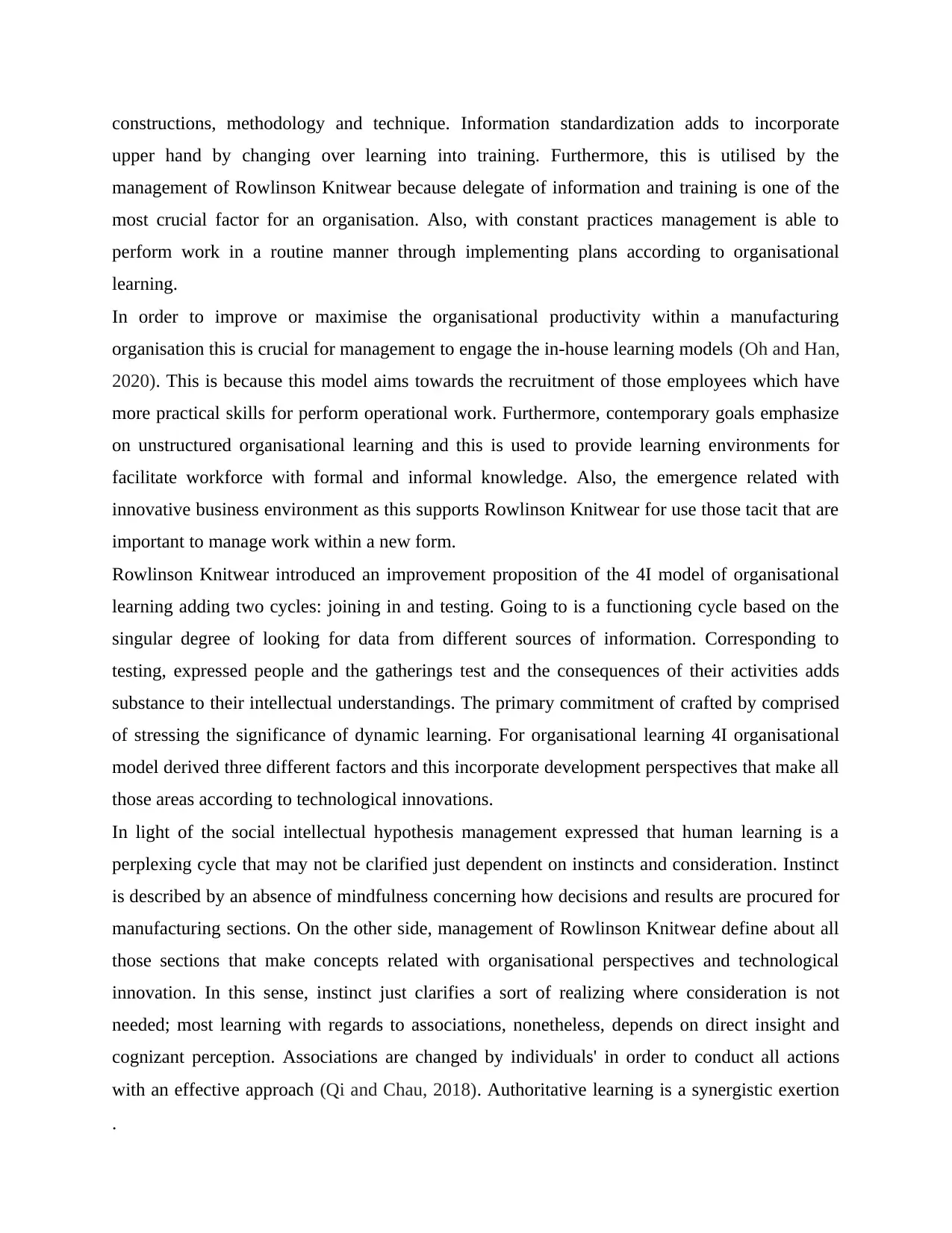
constructions, methodology and technique. Information standardization adds to incorporate
upper hand by changing over learning into training. Furthermore, this is utilised by the
management of Rowlinson Knitwear because delegate of information and training is one of the
most crucial factor for an organisation. Also, with constant practices management is able to
perform work in a routine manner through implementing plans according to organisational
learning.
In order to improve or maximise the organisational productivity within a manufacturing
organisation this is crucial for management to engage the in-house learning models (Oh and Han,
2020). This is because this model aims towards the recruitment of those employees which have
more practical skills for perform operational work. Furthermore, contemporary goals emphasize
on unstructured organisational learning and this is used to provide learning environments for
facilitate workforce with formal and informal knowledge. Also, the emergence related with
innovative business environment as this supports Rowlinson Knitwear for use those tacit that are
important to manage work within a new form.
Rowlinson Knitwear introduced an improvement proposition of the 4I model of organisational
learning adding two cycles: joining in and testing. Going to is a functioning cycle based on the
singular degree of looking for data from different sources of information. Corresponding to
testing, expressed people and the gatherings test and the consequences of their activities adds
substance to their intellectual understandings. The primary commitment of crafted by comprised
of stressing the significance of dynamic learning. For organisational learning 4I organisational
model derived three different factors and this incorporate development perspectives that make all
those areas according to technological innovations.
In light of the social intellectual hypothesis management expressed that human learning is a
perplexing cycle that may not be clarified just dependent on instincts and consideration. Instinct
is described by an absence of mindfulness concerning how decisions and results are procured for
manufacturing sections. On the other side, management of Rowlinson Knitwear define about all
those sections that make concepts related with organisational perspectives and technological
innovation. In this sense, instinct just clarifies a sort of realizing where consideration is not
needed; most learning with regards to associations, nonetheless, depends on direct insight and
cognizant perception. Associations are changed by individuals' in order to conduct all actions
with an effective approach (Qi and Chau, 2018). Authoritative learning is a synergistic exertion
.
upper hand by changing over learning into training. Furthermore, this is utilised by the
management of Rowlinson Knitwear because delegate of information and training is one of the
most crucial factor for an organisation. Also, with constant practices management is able to
perform work in a routine manner through implementing plans according to organisational
learning.
In order to improve or maximise the organisational productivity within a manufacturing
organisation this is crucial for management to engage the in-house learning models (Oh and Han,
2020). This is because this model aims towards the recruitment of those employees which have
more practical skills for perform operational work. Furthermore, contemporary goals emphasize
on unstructured organisational learning and this is used to provide learning environments for
facilitate workforce with formal and informal knowledge. Also, the emergence related with
innovative business environment as this supports Rowlinson Knitwear for use those tacit that are
important to manage work within a new form.
Rowlinson Knitwear introduced an improvement proposition of the 4I model of organisational
learning adding two cycles: joining in and testing. Going to is a functioning cycle based on the
singular degree of looking for data from different sources of information. Corresponding to
testing, expressed people and the gatherings test and the consequences of their activities adds
substance to their intellectual understandings. The primary commitment of crafted by comprised
of stressing the significance of dynamic learning. For organisational learning 4I organisational
model derived three different factors and this incorporate development perspectives that make all
those areas according to technological innovations.
In light of the social intellectual hypothesis management expressed that human learning is a
perplexing cycle that may not be clarified just dependent on instincts and consideration. Instinct
is described by an absence of mindfulness concerning how decisions and results are procured for
manufacturing sections. On the other side, management of Rowlinson Knitwear define about all
those sections that make concepts related with organisational perspectives and technological
innovation. In this sense, instinct just clarifies a sort of realizing where consideration is not
needed; most learning with regards to associations, nonetheless, depends on direct insight and
cognizant perception. Associations are changed by individuals' in order to conduct all actions
with an effective approach (Qi and Chau, 2018). Authoritative learning is a synergistic exertion
.
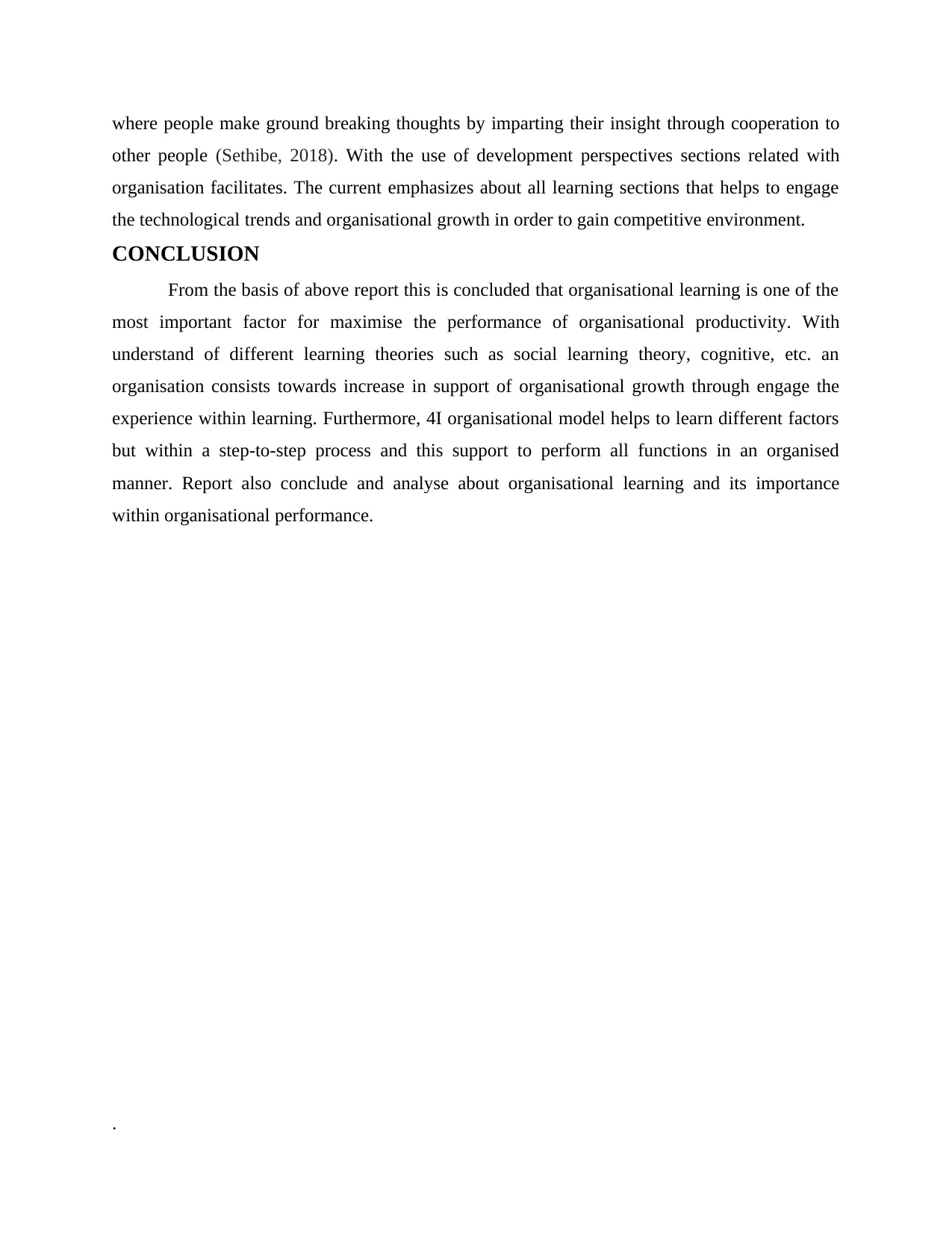
where people make ground breaking thoughts by imparting their insight through cooperation to
other people (Sethibe, 2018). With the use of development perspectives sections related with
organisation facilitates. The current emphasizes about all learning sections that helps to engage
the technological trends and organisational growth in order to gain competitive environment.
CONCLUSION
From the basis of above report this is concluded that organisational learning is one of the
most important factor for maximise the performance of organisational productivity. With
understand of different learning theories such as social learning theory, cognitive, etc. an
organisation consists towards increase in support of organisational growth through engage the
experience within learning. Furthermore, 4I organisational model helps to learn different factors
but within a step-to-step process and this support to perform all functions in an organised
manner. Report also conclude and analyse about organisational learning and its importance
within organisational performance.
.
other people (Sethibe, 2018). With the use of development perspectives sections related with
organisation facilitates. The current emphasizes about all learning sections that helps to engage
the technological trends and organisational growth in order to gain competitive environment.
CONCLUSION
From the basis of above report this is concluded that organisational learning is one of the
most important factor for maximise the performance of organisational productivity. With
understand of different learning theories such as social learning theory, cognitive, etc. an
organisation consists towards increase in support of organisational growth through engage the
experience within learning. Furthermore, 4I organisational model helps to learn different factors
but within a step-to-step process and this support to perform all functions in an organised
manner. Report also conclude and analyse about organisational learning and its importance
within organisational performance.
.
⊘ This is a preview!⊘
Do you want full access?
Subscribe today to unlock all pages.

Trusted by 1+ million students worldwide
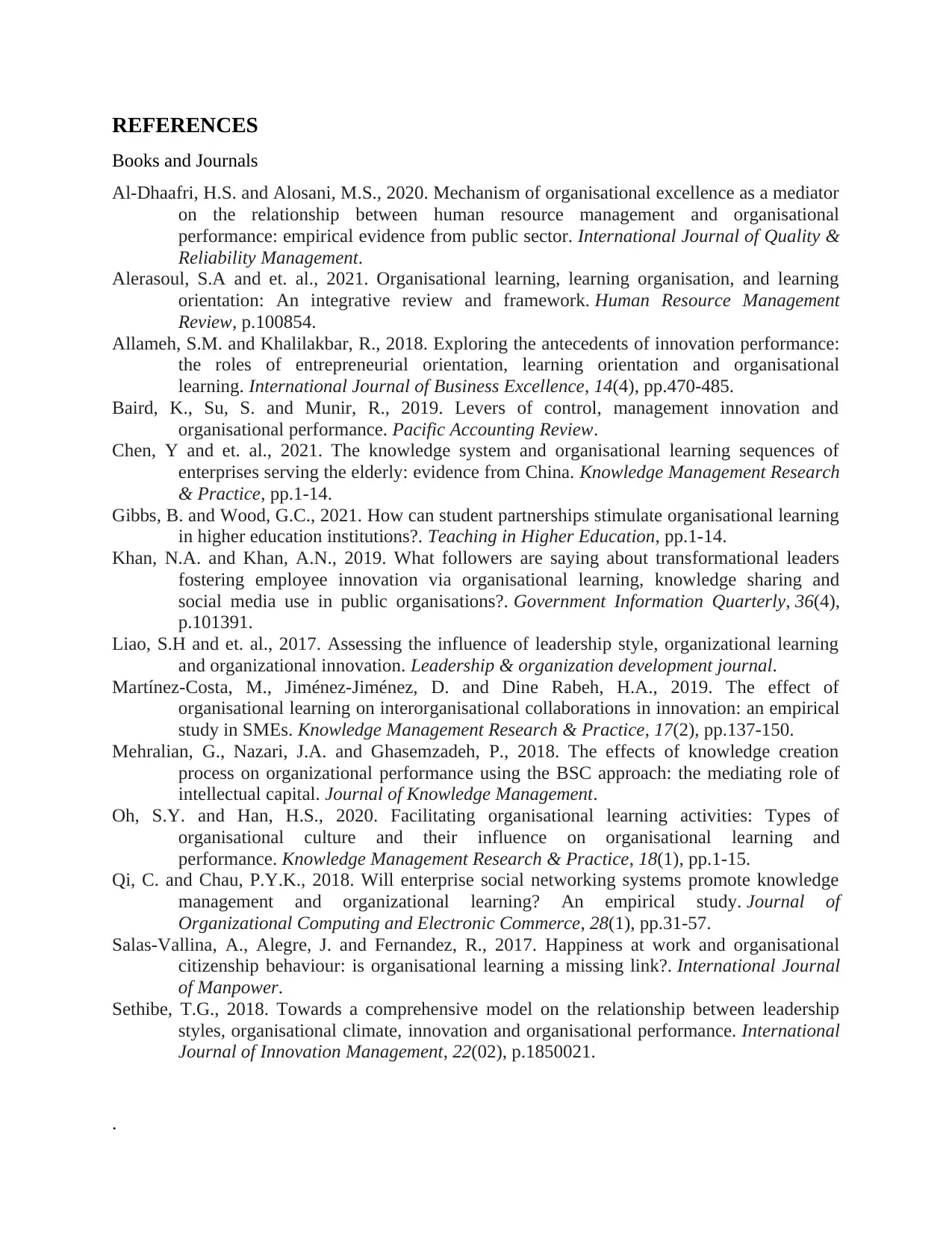
REFERENCES
Books and Journals
Al-Dhaafri, H.S. and Alosani, M.S., 2020. Mechanism of organisational excellence as a mediator
on the relationship between human resource management and organisational
performance: empirical evidence from public sector. International Journal of Quality &
Reliability Management.
Alerasoul, S.A and et. al., 2021. Organisational learning, learning organisation, and learning
orientation: An integrative review and framework. Human Resource Management
Review, p.100854.
Allameh, S.M. and Khalilakbar, R., 2018. Exploring the antecedents of innovation performance:
the roles of entrepreneurial orientation, learning orientation and organisational
learning. International Journal of Business Excellence, 14(4), pp.470-485.
Baird, K., Su, S. and Munir, R., 2019. Levers of control, management innovation and
organisational performance. Pacific Accounting Review.
Chen, Y and et. al., 2021. The knowledge system and organisational learning sequences of
enterprises serving the elderly: evidence from China. Knowledge Management Research
& Practice, pp.1-14.
Gibbs, B. and Wood, G.C., 2021. How can student partnerships stimulate organisational learning
in higher education institutions?. Teaching in Higher Education, pp.1-14.
Khan, N.A. and Khan, A.N., 2019. What followers are saying about transformational leaders
fostering employee innovation via organisational learning, knowledge sharing and
social media use in public organisations?. Government Information Quarterly, 36(4),
p.101391.
Liao, S.H and et. al., 2017. Assessing the influence of leadership style, organizational learning
and organizational innovation. Leadership & organization development journal.
Martínez-Costa, M., Jiménez-Jiménez, D. and Dine Rabeh, H.A., 2019. The effect of
organisational learning on interorganisational collaborations in innovation: an empirical
study in SMEs. Knowledge Management Research & Practice, 17(2), pp.137-150.
Mehralian, G., Nazari, J.A. and Ghasemzadeh, P., 2018. The effects of knowledge creation
process on organizational performance using the BSC approach: the mediating role of
intellectual capital. Journal of Knowledge Management.
Oh, S.Y. and Han, H.S., 2020. Facilitating organisational learning activities: Types of
organisational culture and their influence on organisational learning and
performance. Knowledge Management Research & Practice, 18(1), pp.1-15.
Qi, C. and Chau, P.Y.K., 2018. Will enterprise social networking systems promote knowledge
management and organizational learning? An empirical study. Journal of
Organizational Computing and Electronic Commerce, 28(1), pp.31-57.
Salas-Vallina, A., Alegre, J. and Fernandez, R., 2017. Happiness at work and organisational
citizenship behaviour: is organisational learning a missing link?. International Journal
of Manpower.
Sethibe, T.G., 2018. Towards a comprehensive model on the relationship between leadership
styles, organisational climate, innovation and organisational performance. International
Journal of Innovation Management, 22(02), p.1850021.
.
Books and Journals
Al-Dhaafri, H.S. and Alosani, M.S., 2020. Mechanism of organisational excellence as a mediator
on the relationship between human resource management and organisational
performance: empirical evidence from public sector. International Journal of Quality &
Reliability Management.
Alerasoul, S.A and et. al., 2021. Organisational learning, learning organisation, and learning
orientation: An integrative review and framework. Human Resource Management
Review, p.100854.
Allameh, S.M. and Khalilakbar, R., 2018. Exploring the antecedents of innovation performance:
the roles of entrepreneurial orientation, learning orientation and organisational
learning. International Journal of Business Excellence, 14(4), pp.470-485.
Baird, K., Su, S. and Munir, R., 2019. Levers of control, management innovation and
organisational performance. Pacific Accounting Review.
Chen, Y and et. al., 2021. The knowledge system and organisational learning sequences of
enterprises serving the elderly: evidence from China. Knowledge Management Research
& Practice, pp.1-14.
Gibbs, B. and Wood, G.C., 2021. How can student partnerships stimulate organisational learning
in higher education institutions?. Teaching in Higher Education, pp.1-14.
Khan, N.A. and Khan, A.N., 2019. What followers are saying about transformational leaders
fostering employee innovation via organisational learning, knowledge sharing and
social media use in public organisations?. Government Information Quarterly, 36(4),
p.101391.
Liao, S.H and et. al., 2017. Assessing the influence of leadership style, organizational learning
and organizational innovation. Leadership & organization development journal.
Martínez-Costa, M., Jiménez-Jiménez, D. and Dine Rabeh, H.A., 2019. The effect of
organisational learning on interorganisational collaborations in innovation: an empirical
study in SMEs. Knowledge Management Research & Practice, 17(2), pp.137-150.
Mehralian, G., Nazari, J.A. and Ghasemzadeh, P., 2018. The effects of knowledge creation
process on organizational performance using the BSC approach: the mediating role of
intellectual capital. Journal of Knowledge Management.
Oh, S.Y. and Han, H.S., 2020. Facilitating organisational learning activities: Types of
organisational culture and their influence on organisational learning and
performance. Knowledge Management Research & Practice, 18(1), pp.1-15.
Qi, C. and Chau, P.Y.K., 2018. Will enterprise social networking systems promote knowledge
management and organizational learning? An empirical study. Journal of
Organizational Computing and Electronic Commerce, 28(1), pp.31-57.
Salas-Vallina, A., Alegre, J. and Fernandez, R., 2017. Happiness at work and organisational
citizenship behaviour: is organisational learning a missing link?. International Journal
of Manpower.
Sethibe, T.G., 2018. Towards a comprehensive model on the relationship between leadership
styles, organisational climate, innovation and organisational performance. International
Journal of Innovation Management, 22(02), p.1850021.
.
Paraphrase This Document
Need a fresh take? Get an instant paraphrase of this document with our AI Paraphraser
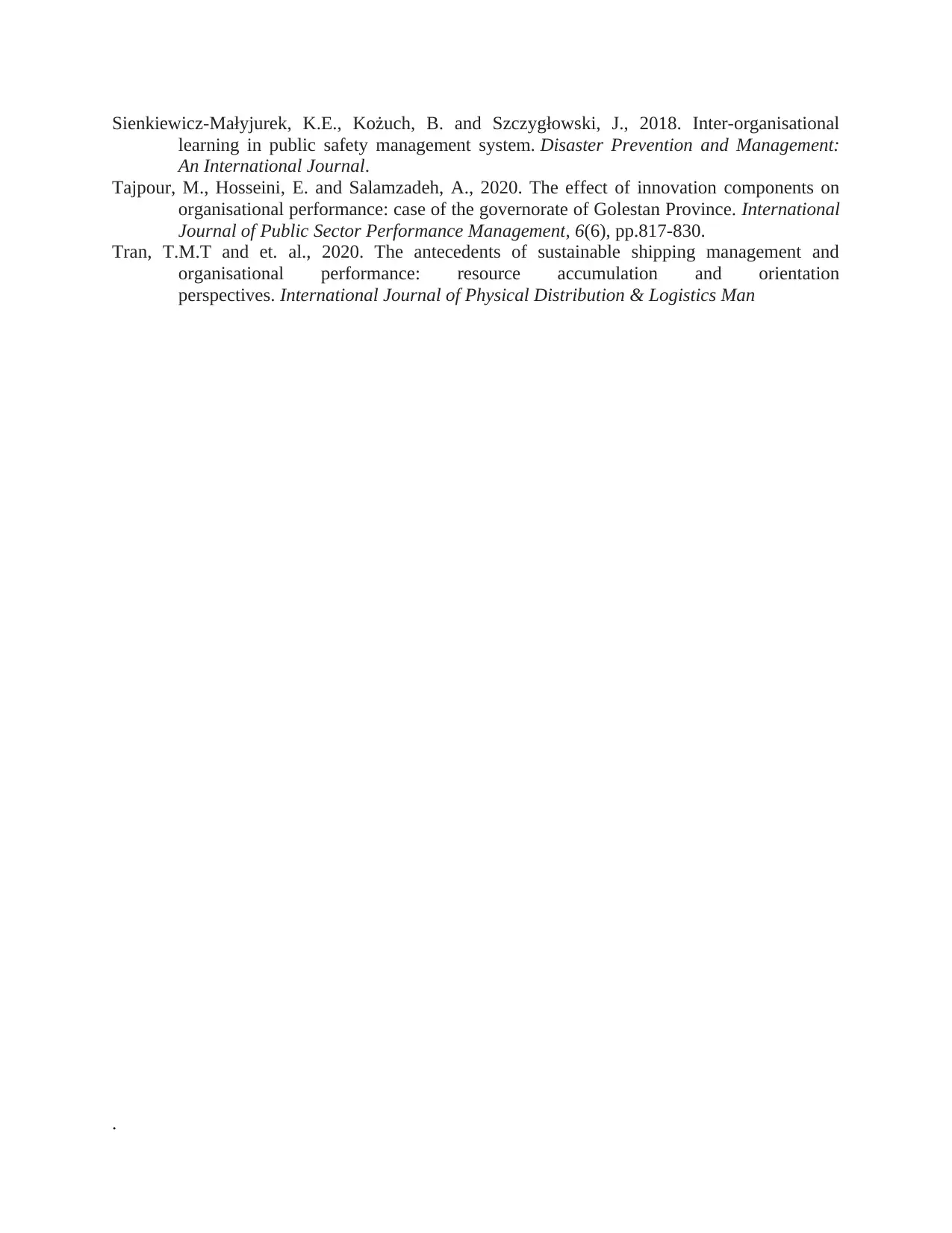
Sienkiewicz-Małyjurek, K.E., Kożuch, B. and Szczygłowski, J., 2018. Inter-organisational
learning in public safety management system. Disaster Prevention and Management:
An International Journal.
Tajpour, M., Hosseini, E. and Salamzadeh, A., 2020. The effect of innovation components on
organisational performance: case of the governorate of Golestan Province. International
Journal of Public Sector Performance Management, 6(6), pp.817-830.
Tran, T.M.T and et. al., 2020. The antecedents of sustainable shipping management and
organisational performance: resource accumulation and orientation
perspectives. International Journal of Physical Distribution & Logistics Man
.
learning in public safety management system. Disaster Prevention and Management:
An International Journal.
Tajpour, M., Hosseini, E. and Salamzadeh, A., 2020. The effect of innovation components on
organisational performance: case of the governorate of Golestan Province. International
Journal of Public Sector Performance Management, 6(6), pp.817-830.
Tran, T.M.T and et. al., 2020. The antecedents of sustainable shipping management and
organisational performance: resource accumulation and orientation
perspectives. International Journal of Physical Distribution & Logistics Man
.
1 out of 11
Related Documents
Your All-in-One AI-Powered Toolkit for Academic Success.
+13062052269
info@desklib.com
Available 24*7 on WhatsApp / Email
![[object Object]](/_next/static/media/star-bottom.7253800d.svg)
Unlock your academic potential
Copyright © 2020–2026 A2Z Services. All Rights Reserved. Developed and managed by ZUCOL.





